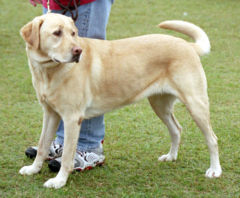-
-
sample data

|
-
-
-
sample data

|
-
sample publication

|
|
Entrez Taxonomy
The dog (Canis lupus) is a mammal in the order Carnivora.
Dogs were domesticated from wolves as recently as 15,000 years, ago
or perhaps as early as 100,000 years ago based upon recent genetic
fossil and DNA evidence.
Dogs, like humans, are highly social animals and this similarity in
their overall behavioral pattern accounts for their trainability,
playfulness, and ability to fit into human households and social
situations. This similarity has earned dogs a unique position in the
realm of interspecies relationships. The loyalty and devotion that
dogs demonstrate as part of their natural instincts as pack animals
closely mimics the human idea of love and friendship, leading many
dog owners to view their pets as full-fledged family members.
Conversely, dogs seem to view their human companions as members of
their pack, and make few, if any, distinctions between their owners
and fellow dogs.
Dogs fill a variety of roles in human society and
are often trained as working dogs. For dogs that do not have
traditional jobs, a wide range of dog sports provide the opportunity
to exhibit their natural skills. In many countries, the most common
and perhaps most important role of dogs is as companions. Dogs have
lived with and worked with humans in so many roles that their
loyalty has earned them the unique sobriquet "man's best friend".
Conversely, some cultures consider dogs to be unclean. In some parts
of the world, dogs are raised as livestock to produce dog meat for
human consumption. In many places, consumption of dog meat is
discouraged by social convention or cultural taboo.
|

|
|
|

